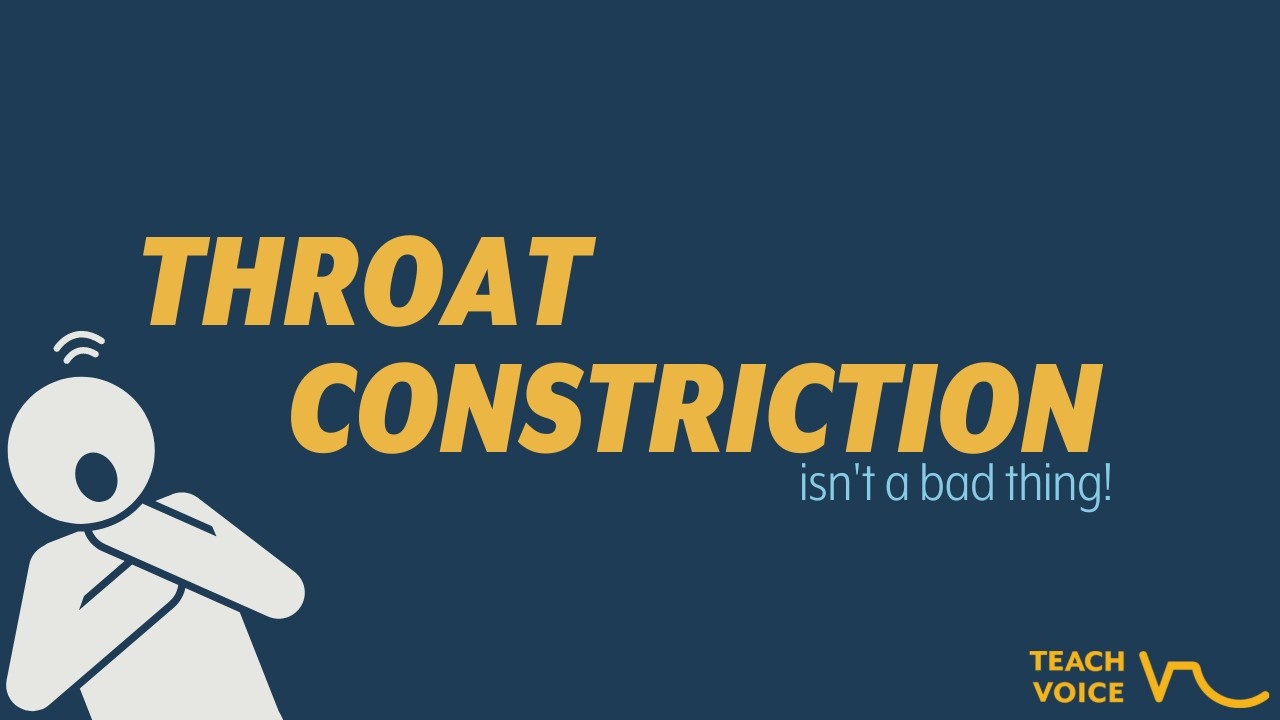Throat constriction IS NOT a bad thing! It's a sign.
Aug 01, 2022
Overall principle: Your nervous system KNOWS what to do!
As teachers, we often we see things like uncomfortable throat constriction or physical tension as bad things that we should get rid of. Top of the list!
But... the truth is it's often what your voice needs in that moment.
Many therapists and coaches treat tensions a bit like blemishes, attempting to rub or stretch them away.
Yet, legions of teachers can't rid their singers of this common vocal problem. It keeps coming back, again and again, no matter how much you try.
Old school thinking
For example, as the age old belief goes, to have good resonance all you need is more space in the throat. On the flip side, your instrument actually needs parts to be constricted to function strongly and flexibly. That has been shown in voice research and musical instrument research a lot in recent years, as well as seen over and over in voice clinic appointments across the world.
It's very old singing teaching practice that is causing us to hang on to the problem of 'more space'.
In fact, there have been great singers who have proudly felt "as open as a barn door" when they have gone to the ENT clinic for an exam, but the throat camera shows a very different story; constriction. Much to the horror of the singer, who instantly scurries away to rid themselves of it.
This is a common example of why the feeling of vocal ease and great function has been misinterpreted as throat openness, but our feelings can lead us astray a lot in singing. Just because you don't feel it, doesn't mean it ain't happening! Constrictions often fall into that category.
This may also be an example of how hard it is to accept that the thing you were taught was sacrilege is actually your saviour. A strong, efficient sound is usually reliant on some form of throat constriction. We can unknowingly obliterate that by asking for throat expansion.
Tighten back up
Many long standing and unresolved tenseness issues are also due to the vocal folds or vocal register. Singers who avoid chest voice often have tight throats and bodies. This is another scenario where your nervous system KNOWS that it needs to somehow replace the resistance that the vocal folds would've offered.
After all, that's how the vocal folds ensure you're going to be loud enough to be heard and not run out of breath in 2 seconds.
By this principle, do we aim to reduce the constriction or work on the vocal fold function for best success?
It's keeping you in business!
In many case, if the body didn't react in these ways we wouldn't have a voice at all! So in that sense, it's lucky we have that compensatory capacity for our survival. It's only there to help us fulfil our desire to communicate, which is essential to our very being.
Sometimes, these throat constrictions can become over-cooked and uncomfortable, mainly because they are keeping the voice going whilst there is a problem. Maybe that problem is a vocal injury, maybe it's a technique thing, maybe it's dysfunctional breath. Whatever it is, if it goes on for long enough it can become a more chronic problem.
Even if that happens, ridding the excessive tightness will only work IF you are also working simultaneously on the thing that has triggered it in the first place. If you don't, you may remove the only thing that is giving that singer any chance at an efficient voice at all.
As an example, this could be a combination of self-massage (IE, reducing the symptoms of throat discomfort) plus working on the stability of chest voice (IE, working on the trigger of discomfort so it stays away).
ALWAYS question
I'm not saying you should let your students tenseness problems continue! But I am saying that it's very valuable to first ask why they are there. Does the nervous system know something I don't? Is this actually a necessary thing for the current situation? What needs to be back in business to absolve the uncomfortable constriction of its compensatory duty?
THAT'S where you get lasting change
I'm also saying that certain constrictions are part and parcel of a healthy, expressive, high functioning voice. To aim for space as a default is a bit of a misnomer. Focussing on things like effort level, energy, intention, sensation and sound will take care of our throats pretty well.
As a plus, your students won't need to get involved so much this way either, which is a lot less to think about. Hence, more brain capacity to focus on that performance!
Want to become a master problem solver?
Our 'Evolve' Teacher Training Course could be just what you need to take your teaching to a new level.
Book your free discovery call and let's talk!
Stay connected with news and updates!
Join our mailing list to receive the latest news and updates from our team.
Don't worry, your information will not be shared.
We hate SPAM. We will never sell your information, for any reason.
